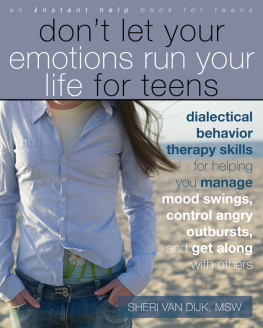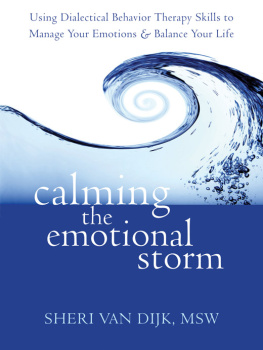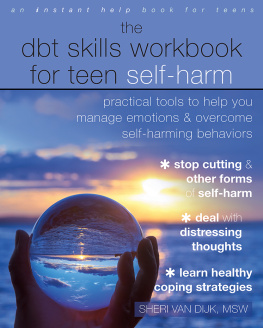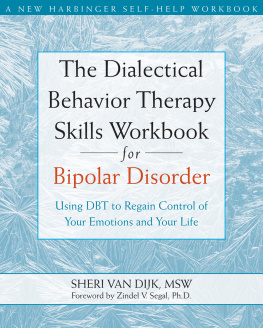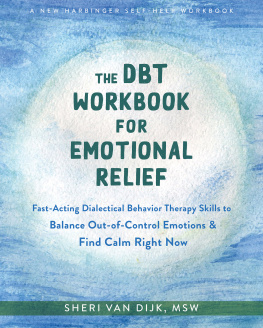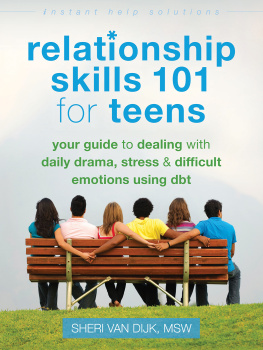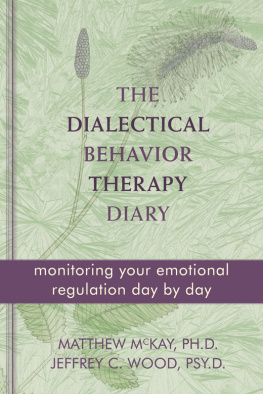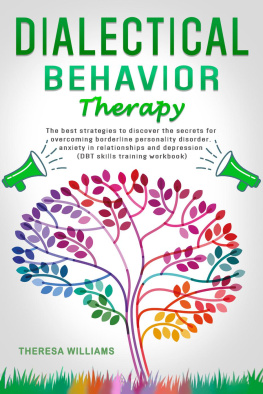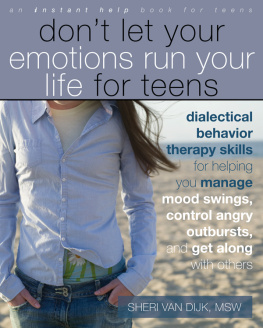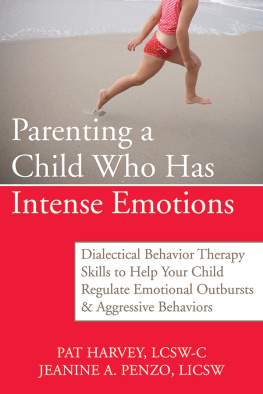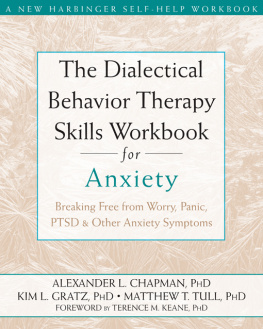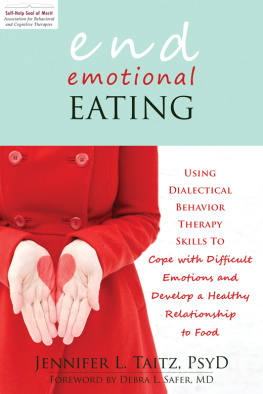Sheri Van Dijk - Dont Let Your Emotions Run Your Life for Teens. Dialectical Behavior Therapy Skills for Helping You Manage Mood Swings, Control...
Here you can read online Sheri Van Dijk - Dont Let Your Emotions Run Your Life for Teens. Dialectical Behavior Therapy Skills for Helping You Manage Mood Swings, Control... full text of the book (entire story) in english for free. Download pdf and epub, get meaning, cover and reviews about this ebook. year: 2011, publisher: New Harbinger Publications, genre: Religion. Description of the work, (preface) as well as reviews are available. Best literature library LitArk.com created for fans of good reading and offers a wide selection of genres:
Romance novel
Science fiction
Adventure
Detective
Science
History
Home and family
Prose
Art
Politics
Computer
Non-fiction
Religion
Business
Children
Humor
Choose a favorite category and find really read worthwhile books. Enjoy immersion in the world of imagination, feel the emotions of the characters or learn something new for yourself, make an fascinating discovery.
- Book:Dont Let Your Emotions Run Your Life for Teens. Dialectical Behavior Therapy Skills for Helping You Manage Mood Swings, Control...
- Author:
- Publisher:New Harbinger Publications
- Genre:
- Year:2011
- Rating:4 / 5
- Favourites:Add to favourites
- Your mark:
- 80
- 1
- 2
- 3
- 4
- 5
Dont Let Your Emotions Run Your Life for Teens. Dialectical Behavior Therapy Skills for Helping You Manage Mood Swings, Control...: summary, description and annotation
We offer to read an annotation, description, summary or preface (depends on what the author of the book "Dont Let Your Emotions Run Your Life for Teens. Dialectical Behavior Therapy Skills for Helping You Manage Mood Swings, Control..." wrote himself). If you haven't found the necessary information about the book — write in the comments, we will try to find it.
Sheri Van Dijk: author's other books
Who wrote Dont Let Your Emotions Run Your Life for Teens. Dialectical Behavior Therapy Skills for Helping You Manage Mood Swings, Control...? Find out the surname, the name of the author of the book and a list of all author's works by series.
Dont Let Your Emotions Run Your Life for Teens. Dialectical Behavior Therapy Skills for Helping You Manage Mood Swings, Control... — read online for free the complete book (whole text) full work
Below is the text of the book, divided by pages. System saving the place of the last page read, allows you to conveniently read the book "Dont Let Your Emotions Run Your Life for Teens. Dialectical Behavior Therapy Skills for Helping You Manage Mood Swings, Control..." online for free, without having to search again every time where you left off. Put a bookmark, and you can go to the page where you finished reading at any time.
Font size:
Interval:
Bookmark:
Its important for you to think about your current patterns or habits so you can then think about what you need to change. Over the next few days, try to notice where your thoughts tend to wander to: Do you think about the past a lot? Do you often find yourself living in the future? Write about whatever you notice here:
___________
___________
___________
Have you noticed that your thoughts tend to wander more in certain situations or when youre doing certain things? If so, in which situations or activities does your mind tend to wander?
When your thoughts have wandered from the present moment, what kinds of emotions come up for you? Write anything youve noticed here:
___________
___________
___________
The worksheet on the next page can help you sort out your thoughts, emotions, and behaviors. Its a great idea to make some copies of it and fill one in whenever youre experiencing intense emotions or feeling confused about a situation; if necessary, you can come back to the worksheet to complete it after the situation. The sample entries here are based on Jacobs story from chapter 1.


Just because you have a thought or an emotion doesnt mean its true. You might think, Ill never have a best friend, but thats just a thought, not the truth. You might feel unloved, but that doesnt mean you are unlovedits just how you feel. Our thoughts and feelings often seem true to us, so its important to remember that theyre just thoughts and feelings, not facts. This mindfulness exercise can help you practice noticing whats a thought, whats a feeling, and whats a behavior, and that will also help you detach from your thoughts and feelingsin other words, it will help you just observe your thoughts and feelings and remember that they arent facts.
Until you are familiar with this exercise, you might find it helpful to have someone read the instructions to you.
Observing your thoughts and emotions in a river
Sitting or lying down in a relaxed position, close your eyes. In your mind, picture yourself standing in a shallow river. The water comes to just above your knees, and a gentle current pushes against your legs. As you stand in the river, notice your thoughts and emotions slowly start to float down the river, gliding past you on the current. Dont try to hold on to them as they float by, and dont get caught up in them; simply watch them as they float past you down the river. If you notice yourself getting caught up thinking about a thought or an emotion so that youre going down the river with it instead of just watching it float past, come back to just standing in the river. Bring your attention back to the exercise and focus on just observing. As best you can, dont judge the thoughts or feelings that go by; just become aware of their presence.
Observing your thoughts and emotions in clouds
Heres a second way you can practice this exercise: Imagine yourself lying in a field of grass, looking up at the fluffy white clouds. In each cloud, you can see a thought or a feeling you are experiencing; observe each thought or feeling as it slowly floats by. Dont judge them, and dont label them; just observe them as they float through your mind. Dont grab the thoughts or emotions, and dont get caught up thinking about themjust notice them. If you notice that youve gotten carried away with a particular cloud, bring yourself back to lying in the field of grass. If you notice your attention straying from the exercise, bring your attention back to observing and labeling the thoughts and emotions, without judging yourself.
In this chapter, youve practiced naming your emotions and learned that they serve a purpose. Youve also learned that thoughts, emotions, and behaviors are interconnected and that it can be hard to separate them but that doing so is very important in learning to manage your emotions more effectively. Finally, you learned to start thinking of your thoughts and emotions as just thatthoughts and emotions, rather than facts. As you go through this workbook, continue to practice the mindfulness exercises and other skills provided. It may take a lot of time and energy at the beginning, but the more you practice, the more effective you will become at not letting your emotions control you.
For each of the following stories, see if you can determine which way of thinking is being depictedreasoning self, emotional self, or wise selfand circle the one that is most appropriate. The answers will be provided on page 148.
- Tanya was at a party when a friend passed her a bottle of beer. She thought, Everyone else is drinking. Will they accept me if I dont? Then she remembered that she had an important exam on Monday; she realized she wouldnt study well the next day if she got drunk that night, so she said, No thanks.
Reasoning Self Emotional Self Wise Self
- Ty was really nervous about asking Jessica to the prom, but he got up his courage and asked her anyway. When she turned him down, he was devastated at first, but then he thought to himself, Whateverits better this way because I can really only afford to buy one ticket.
Reasoning Self Emotional Self Wise Self
- Makenna was so angry at her parents because they wouldnt let her go camping with her friends this weekend. She asked them again near the end of the week, but they werent budging on their decision. She was so disappointed and frustrated that she started to yell at her parents and told them she hated them.
Reasoning Self Emotional Self Wise Self
- Riley often worried about fitting in with the other kids at school, which made it hard for him to socialize. One day he decided enough was enoughhe was just going to start doing it anyway. He knew he always had a good time when he did spend time with friends, so he approached a group of people at school and joined in the conversation, even though he felt anxious.
Reasoning Self Emotional Self Wise Self
- Catrina was taking an English exam. Even though she felt it was going fairly well, she decided to throw in some extra facts, like Shakespeares date and place of birth, which she figured would get her some additional points.
Reasoning Self Emotional Self Wise Self
- Jody was playing around on his skateboard at school when he noticed a bunch of kids watching him. He wanted to impress them, so he decided to try a really hard trick on the stairs to make himself look good, even though he wasnt sure hed be able to land it.
Reasoning Self Emotional Self Wise Self
Now that you have a better understanding of these three different ways of thinking about things, its important to start applying this skill in your own life. The first step is to assess your patterns in the present.
People often act from more than one of these perspectives, depending on the situation and the people theyre dealing with. Put a check mark beside the statements that you think apply to you, to help you determine if you tend to think from one of these perspectives more than the others.
Am I a reasoner?
- I often ignore my emotions when making a decision.
Font size:
Interval:
Bookmark:
Similar books «Dont Let Your Emotions Run Your Life for Teens. Dialectical Behavior Therapy Skills for Helping You Manage Mood Swings, Control...»
Look at similar books to Dont Let Your Emotions Run Your Life for Teens. Dialectical Behavior Therapy Skills for Helping You Manage Mood Swings, Control.... We have selected literature similar in name and meaning in the hope of providing readers with more options to find new, interesting, not yet read works.
Discussion, reviews of the book Dont Let Your Emotions Run Your Life for Teens. Dialectical Behavior Therapy Skills for Helping You Manage Mood Swings, Control... and just readers' own opinions. Leave your comments, write what you think about the work, its meaning or the main characters. Specify what exactly you liked and what you didn't like, and why you think so.

